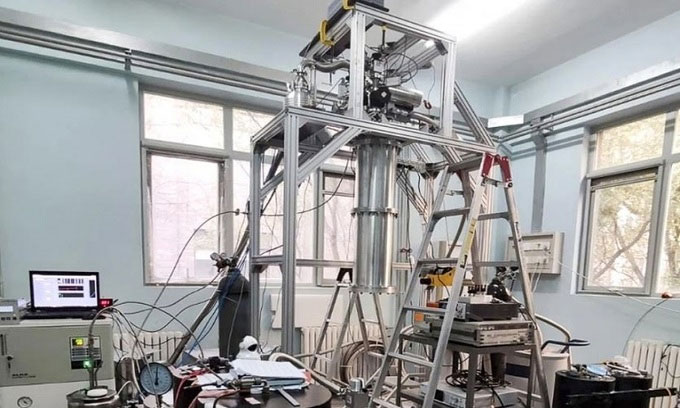Chinese scientists successfully created a refrigerator with a temperature close to absolute zero
Chinese scientists developed a refrigerator prototype with a temperature only 0.01 degrees Celsius higher than absolute zero.
The Institute of Physics of the Chinese Academy of Sciences in Beijing believes that a new Chinese-made refrigerator can solve a major problem in the field of quantum computing, marking a major step forward to help the country become technologically self-reliant. A real challenge with quantum computers, which are capable of many tasks, including accelerating the development of artificial intelligence, is the need for extremely cold temperatures and isolated environments.

The new refrigerator prototype can reach the extremely low temperatures needed for quantum computers. (Photo: Academy of Sciences).
"The research team will continue to improve technology so that the new generation of refrigerators under development can achieve the quality of imported products in terms of usefulness and stability ," said Ji Zhongqing, a graduate student at the institute.
According to Xinhua, the refrigerator model has an extremely low temperature, only 0.01 degrees Celsius higher than absolute zero (-273.15 degrees Celsius) . Absolute zero is the lowest temperature at which all thermal motion stops. According to Ji, the refrigerator prototype does not need liquid helium to lower the temperature like a conventional refrigerator, has more space inside, can run longer, and is very easy to control and maintain. Refrigerators that do not require liquid helium have become increasingly popular in recent years.
China opened its first large-scale helium plant last year in an effort to reduce dependence on imports of high-tech products. Helium is a noble gas, meaning it is stable and does not react with other elements, even in extreme environments. Helium is super light, colorless and in limited supply. Nearly all helium is used in China, whether to fuel Long March 5 rockets, to protect metals during welding, to produce laser lights or to create ultra-clean environments to produce computer chips. , all come from abroad, mainly the US or US facilities in other countries.
Denver Li Danfeng, assistant professor of physics at the University of Hong Kong, said the introduction of the refrigerator model could help China gain an edge in the race to develop quantum computers and low-temperature technologies.
- Long strides close to the secret of absolute zero
- Successfully created a non-electric refrigerator
- Who created the refrigerator?
- How to arrange food in the refrigerator to keep it longer
- Science is close to 'cooking' the 'cosmic soup'
- To live longer, reduce your body temperature
- Magnetic properties disappear at almost 0 degrees absolute
- Why does the refrigerator freeze and should this layer of snow be removed?
- Russian scientists invented a high-performance magnetic refrigerator
- There is evidence that cannot be achieved 'absolute zero'.
- Mitticool: Special refrigerator made of clay
- 'Consecutive' refrigerator
 The US company is about to build a supersonic passenger plane of 6,000km / h
The US company is about to build a supersonic passenger plane of 6,000km / h Japan develops avatar robot as in fiction film
Japan develops avatar robot as in fiction film Australia tested the world's first mango picking robot
Australia tested the world's first mango picking robot America develops technology to separate water from animal waste
America develops technology to separate water from animal waste Super simple tip to save electricity: Put a bowl of water in the refrigerator!
Super simple tip to save electricity: Put a bowl of water in the refrigerator!  Risk of food poisoning due to storing too much food in the refrigerator
Risk of food poisoning due to storing too much food in the refrigerator  Why does the refrigerator freeze and should this layer of snow be removed?
Why does the refrigerator freeze and should this layer of snow be removed?  How long can leftovers from Tet be stored in the refrigerator?
How long can leftovers from Tet be stored in the refrigerator?  Solar refrigerators support Covid-19 vaccination program
Solar refrigerators support Covid-19 vaccination program  Tips for storing each type of food in the refrigerator
Tips for storing each type of food in the refrigerator 